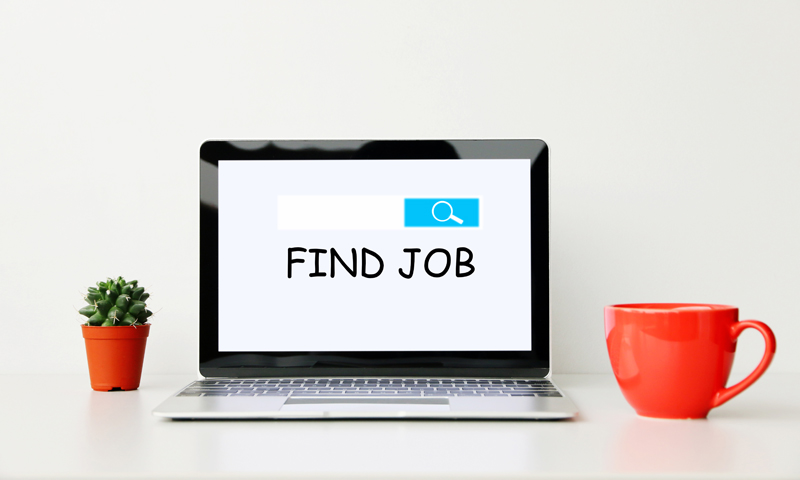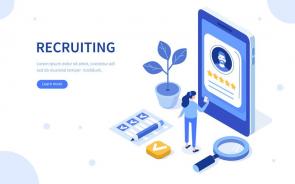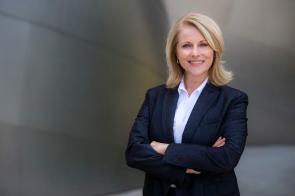
Here the candidate voluntarily left her job in big law because the firm was not a good fit. She thought she would take a month or two off for a mental health break, then quickly find a job once she started to look for something new. Unfortunately, it was not as easy to find a new job as she thought it would be. After a couple of months of looking, I got the candidate a couple of interviews with prestigious firms. Then the pandemic hit. The candidate was close to an offer with both firms when they put all hiring on hold. One of the firms stayed in touch with the candidate. The head of the practice group really liked her and checked in with her periodically. The other firm went completely silent. I have not heard anything from them since the start of the pandemic, despite following up with them multiple times and having a personal connection with the human resources manager. Every firm has managed hiring during the pandemic differently, and some are more risk adverse than others.
There were several things about this candidate that made her stand out from other candidates. First, she went to a Top 10 law school and did extremely well there. She attended law school on a merit scholarship and won several awards there, including one for her contribution to student life in the law school. She was a student leader and active in several student affinity groups. She also had an undergraduate and graduate degree in science fields. She is an intellectual property litigator and science degrees are necessary for anyone in intellectual property law.
This candidate also had an amazing work history. She started her career with a well-known intellectual property boutique that had a national reputation and offices in multiple cities. She was a summer associate there and then worked at the firm for the first five years of her career. She was the lead associate in multi-million-dollar IP litigation matters, managing all aspects of litigation before the Patent Trial and Appeals Board, district courts, and circuit courts. She received outstanding reviews from the partners she worked with and had a great relationship with the firm.
She then decided to make the lateral move to an Am Law firm because she wanted a more general practice. She thought that she would have an easier time building a book of business if she could cross-sell other work in the firm. The Am Law firm aggressively recruited her because of her outstanding credentials and experience. Unfortunately, it was not a good culture fit and the candidate did not get good work at the new firm. She tried to make it work but decided to leave after a year. Fortunately, she had long term employment with her first firm, so it was easier to overcome the short stay at her second firm.
This candidate came to me for help early in her search. She looked for in-house opportunities on her own but trusted me to take the lead with law firms. I started by researching all the firms in Atlanta with sophisticated intellectual property practices. With her permission, I submitted her to all the active job postings. I also sent blind feelers to firms that were not currently looking but had looked in the past or was a good fit for her practice.
The firm where I ultimately placed her did not have an opening when I first reached out. I sent them a feeler because they are well known for their IP practice. Their recruiting manager quickly responded and asked me to send a full submission. Shortly after that they posted a job for a slightly more junior IP litigator. They interviewed her for the job and mentioned that they were really looking for someone more junior but liked her. She was flexible regarding class year, so they decided to move ahead. The candidate has a wonderful, outgoing personality, so she hit it off with everyone in the group during her first meeting. During her first interview, she was scheduled to meet with the head of the group and another partner. She ran into one of her former co-workers at the firm, who she previously worked with at her first firm. He asked her for coffee and invited other associates along to meet her. What was supposed to be a short screening interview went on for several hours.
It seemed like the perfect fit. Everything came to an abrupt halt with the Covid-19 outbreak. The firm reached out to the candidate and let her know that they were putting the search on hold until they knew more about their hiring needs. We did not hear from their recruiter for several months, although the head of the practice group stayed in touch with the candidate.
After almost five months, the firm reached back out to me to see if the candidate was still available and interested in the firm. She was interviewing with in-house positions but was still extremely interested in moving forward with the firm. They quickly arranged video interviews via Zoom, and she met with members of the practice group in several offices that she would be working with. The firm also scheduled her to speak with the head of the practice group at the end of the interview. He was very direct with her. He told her that he liked her and wanted to hire her but would have to explain her departure from her last firm and period of unemployment to his other partners. The candidate was honest in her response. She explained why the firm was not a great culture fit, which she believed was partly because she is African American. She felt excluded from the group and was not getting good assignments. Honesty is the best policy and the partner appreciated her candor. They spoke for over an hour. It was a fantastic opportunity for them to get to know one another.
The next day I heard from the firm's recruiting manager. She told me that the partners were extremely excited about the candidate, but they wanted to check her references first. Recently I have noticed a trend that firms do not often check references. However, they may ask for references in cases like this, where they have lingering questions and want confirmation that the candidate is telling the truth about the situation. The firm asked for partner references, which she was easily able to give for her first firm. It was a bit trickier for the second firm because things did not end well there. Fortunately, she had a great relationship with a senior attorney who left the firm for similar reasons. This attorney was not a partner, but she did supervise the candidates work and could confirm what happened at the firm.
The firm quickly made an offer to the candidate after checking her references. The head of the practice group called the candidate to give her the good news. The offer was for a bit less than we expected. Many firms have instituted temporary salary reductions during the pandemic, which they will reevaluate at the end of the year. This firm is no exception to this trend. With salary reductions come lower offers. The partner mentioned this fact when he made the offer and explained that they would reevaluate her salary later. She took a day to consider it and accepted the offer. She started work at her new firm a week later. The firm has great hopes for her and she them.
A couple of take-aways from this case study: 1) Unemployed candidates are marketable to big firms - they just have to be patient and expect a longer than normal job search; 2) specialists are very marketable - intellectual property is still a busy practice area during the pandemic and firms are hiring in this area; 3) it is good to be flexible regarding class year if it means you will get into a good firm and be on the partnership track; 4) firms are hiring during the pandemic, though starting salary may be lower if the firm has instituted firm wide salary reductions.
This search demonstrates that candidates can find great offers if they are patient.
About Harrison Barnes
No legal recruiter in the United States has placed more attorneys at top law firms across every practice area than Harrison Barnes. His unmatched expertise, industry connections, and proven placement strategies have made him the most influential legal career advisor for attorneys seeking success in Big Law, elite boutiques, mid-sized firms, small firms, firms in the largest and smallest markets, and in over 350 separate practice areas.
A Reach Unlike Any Other Legal Recruiter
Most legal recruiters focus only on placing attorneys in large markets or specific practice areas, but Harrison places attorneys at all levels, in all practice areas, and in all locations-from the most prestigious firms in New York, Los Angeles, and Washington, D.C., to small and mid-sized firms in rural markets. Every week, he successfully places attorneys not only in high-demand practice areas like corporate and litigation but also in niche and less commonly recruited areas such as:
- Immigration Law
- Workers Compensation
- Insurance
- Family Law
- Trust and Estate
- Municipal law
- And many more...
This breadth of placements is unheard of in the legal recruiting industry and is a testament to his extraordinary ability to connect attorneys with the right firms, regardless of market size or practice area.
Proven Success at All Levels
With over 25 years of experience, Harrison has successfully placed attorneys at over 1,000 law firms, including:
- Top Am Law 100 firms such including Sullivan and Cromwell, and almost every AmLaw 100 and AmLaw 200 law firm.
- Elite boutique firms with specialized practices
- Mid-sized firms looking to expand their practice areas
- Growing firms in small and rural markets
He has also placed hundreds of law firm partners and has worked on firm and practice area mergers, helping law firms strategically grow their teams.
Unmatched Commitment to Attorney Success - The Story of BCG Attorney Search
Harrison Barnes is not just the most effective legal recruiter in the country, he is also the founder of BCG Attorney Search, a recruiting powerhouse that has helped thousands of attorneys transform their careers. His vision for BCG goes beyond just job placement; it is built on a mission to provide attorneys with opportunities they would never have access to otherwise. Unlike traditional recruiting firms, BCG Attorney Search operates as a career partner, not just a placement service. The firm's unparalleled resources, including a team of over 150 employees, enable it to offer customized job searches, direct outreach to firms, and market intelligence that no other legal recruiting service provides. Attorneys working with Harrison and BCG gain access to hidden opportunities, real-time insights on firm hiring trends, and guidance from a team that truly understands the legal market. You can read more about how BCG Attorney Search revolutionizes legal recruiting here: The Story of BCG Attorney Search and What We Do for You.
The Most Trusted Career Advisor for Attorneys
Harrison's legal career insights are the most widely followed in the profession.
- His articles on BCG Search alone are read by over 150,000 attorneys per month, making his guidance the most sought-after in the legal field. Read his latest insights here.
- He has conducted hundreds of hours of career development webinars, available here: Harrison Barnes Webinar Replays.
- His placement success is unmatched-see examples here: Harrison Barnes' Attorney Placements.
- He has created numerous comprehensive career development courses, including BigLaw Breakthrough, designed to help attorneys land positions at elite law firms.
Submit Your Resume to Work with Harrison Barnes
If you are serious about advancing your legal career and want access to the most sought-after law firm opportunities, Harrison Barnes is the most powerful recruiter to have on your side.
Submit your resume today to start working with him: Submit Resume Here
With an unmatched track record of success, a vast team of over 150 dedicated employees, and a reach into every market and practice area, Harrison Barnes is the recruiter who makes career transformations happen and has the talent and resources behind him to make this happen.
A Relentless Commitment to Attorney Success
Unlike most recruiters who work with only a narrow subset of attorneys, Harrison Barnes works with lawyers at all stages of their careers, from junior associates to senior partners, in every practice area imaginable. His placements are not limited to only those with "elite" credentials-he has helped thousands of attorneys, including those who thought it was impossible to move firms, find their next great opportunity.
Harrison's work is backed by a team of over 150 professionals who work around the clock to uncover hidden job opportunities at law firms across the country. His team:
- Finds and creates job openings that aren't publicly listed, giving attorneys access to exclusive opportunities.
- Works closely with candidates to ensure their resumes and applications stand out.
- Provides ongoing guidance and career coaching to help attorneys navigate interviews, negotiations, and transitions successfully.
This level of dedicated support is unmatched in the legal recruiting industry.
A Legal Recruiter Who Changes Lives
Harrison believes that every attorney-no matter their background, law school, or previous experience-has the potential to find success in the right law firm environment. Many attorneys come to him feeling stuck in their careers, underpaid, or unsure of their next steps. Through his unique ability to identify the right opportunities, he helps attorneys transform their careers in ways they never thought possible.
He has worked with:
- Attorneys making below-market salaries who went on to double or triple their earnings at new firms.
- Senior attorneys who believed they were "too experienced" to make a move and found better roles with firms eager for their expertise.
- Attorneys in small or remote markets who assumed they had no options-only to be placed at strong firms they never knew existed.
- Partners looking for a better platform or more autonomy who successfully transitioned to firms where they could grow their practice.
For attorneys who think their options are limited, Harrison Barnes has proven time and time again that opportunities exist-often in places they never expected.
Submit Your Resume Today - Start Your Career Transformation
If you want to explore new career opportunities, Harrison Barnes and BCG Attorney Search are your best resources. Whether you are looking for a BigLaw position, a boutique firm, or a move to a better work environment, Harrison's expertise will help you take control of your future.
Submit Your Resume Here to get started with Harrison Barnes today.
Harrison's reach, experience, and proven results make him the best legal recruiter in the industry. Don't settle for an average recruiter-work with the one who has changed the careers of thousands of attorneys and can do the same for you.
About BCG Attorney Search
BCG Attorney Search matches attorneys and law firms with unparalleled expertise and drive, while achieving results. Known globally for its success in locating and placing attorneys in law firms of all sizes, BCG Attorney Search has placed thousands of attorneys in law firms in thousands of different law firms around the country. Unlike other legal placement firms, BCG Attorney Search brings massive resources of over 150 employees to its placement efforts locating positions and opportunities its competitors simply cannot. Every legal recruiter at BCG Attorney Search is a former successful attorney who attended a top law school, worked in top law firms and brought massive drive and commitment to their work. BCG Attorney Search legal recruiters take your legal career seriously and understand attorneys. For more information, please visit www.BCGSearch.com.





